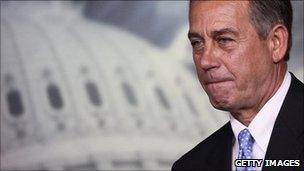China state media agency Xinhua criticises US on debt
- Published

Republican John Boehner and the president are at loggerheads over debt plans
China's state-run media have labelled US domestic politicians "dangerously irresponsible" for wrangling over debt.
In an editorial, Xinhua news agency accused US politicians of playing a "game of chicken" over the issue, saying the rest of the world had been "kidnapped" by American politics.
Beijing has not officially commented on the US battle to avoid a debt default.
The US Congress needs to agree on raising its borrowing limit by next Tuesday or it will default on its debt.
Although most Democrats and Republicans broadly agree on raising the debt ceiling and reducing public spending, the sticking point is the length of time the higher debt limit is in place.
The Democrats want the higher ceiling to remain until after next year's presidential election, but Republicans will agree only to a short-term measure.
Liquidity 'flood'
The Xinhua editorial, external said many other countries would be in the "impact zone" if US politicians failed to agree a deal.
"With leadership comes responsibility. It is unfortunate and disappointing that when political leaders in Washington spar over who is doing good for their country, they take little account of the world's economic soundness," the article said.
"Given the United States' status as the world's largest economy and the issuer of the dominant international reserve currency, such political brinkmanship in Washington is dangerously irresponsible.
"It risks, among other consequences, strangling the still fragile economic recovery of not only the United States but also the world as a whole."
The mouthpiece of China's ruling Communist Party, the People's Daily, also warned of the consequences of a default.
In comments translated by the AFP news agency, the paper said a default could hurt the US dollar and trigger a "torrential flood" of liquidity into the global economy, fuelling inflation in emerging economies such as China.
- Published29 July 2011
- Published28 July 2011
- Published2 August 2011
- Published27 July 2011